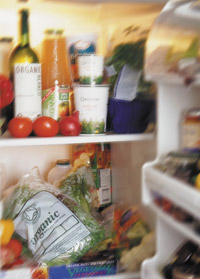Detox: what we know and what we can do
by Karen Lamphere, MS, CN
This article was originally published in May 2007

(May 2007) — Detoxification diets that aim to rid the body of toxins are more popular than ever. Dozens of books are on the market touting diet plans that run the gamut from water fasting to drinking fruit and vegetable juices, to special cleansing diets. “Detox kits” that promise to clean your liver, kidneys and bowels dot the supplement aisles.
Do these diets and supplements work? Is it possible to cleanse the body safely from toxic buildup?
It’s easy to understand the interest in detoxing the body — we live in a world awash with pollution, pesticides, PCBs, phthalates, parabens … the list goes on. It’s estimated that we’re exposed to more than 500 chemicals and toxic substances every day.
According to a study of toxic chemicals in Washingtonians (see www.pollutioninpeople.org), every person tested carried at least 26 and as many as 39 of the toxic chemicals tested for. These chemicals have been associated with hormone disruption, suppressed immune function, various cancers and perhaps even obesity.
It’s no longer a question of whether we’re carrying a burden of toxic compounds, but how much.
The body, in its amazing intelligence, is designed to rid itself of chemicals, drugs and other pollutants. In fact, detoxification is the liver’s primary function. This process transforms chemicals into new compounds that the body can excrete.
The liver’s highly complex detoxification systems are strongly influenced by a person’s environment, diet, lifestyle, age and genetics.
There’s considerable research showing that dietary protein and compounds in certain fruits, vegetables, herbs and spices can enhance this process, increasing the liver’s ability to neutralize toxins before they can react with DNA or cause damage to cells. Studies show that cruciferous vegetables (cabbage, broccoli, cauliflower, kale, collards and rapini) are particularly effective.
The botanicals milk thistle and artichoke and the spice turmeric are a few examples of compounds known to stimulate either bile flow or certain liver enzymes, both of which aid in detoxification.
Supporting healthy digestion and elimination is equally important. Diets that eliminate common food allergens can reduce gut inflammation. Diets and supplements high in fiber support intestinal health and promote removal of toxins excreted by the liver in bile, and may decrease the absorption of some toxins.
Specific probiotic (friendly) bacteria may have properties that enable them to bind toxins from food and water. Many detox products contain fiber and probiotics for this reason.
However, claims that following a detoxification program for a week or two will flush your body of stored toxins are suspect. Even healthy people with well-functioning detoxification systems have difficulty breaking down certain chemicals.
Many of the so-called persistent organic pollutants (POPs) that we’re exposed to dissolve in fat but not in water and thus tend to accumulate in fatty tissues. One way to get rid of those chemicals is to lose weight, but rapid weight loss through extreme dieting or through water or juice fasting can release stored toxins into the bloodstream at a rate that may overwhelm the body’s capacity for detoxifying them.
Since effective detoxification is highly dependent on adequate levels of nutrients, water or juice fasting actually can hinder the body’s ability to break down and excrete toxins.
It should be emphasized that at this time there’s really no general scientific agreement and very few human studies about useful or safe methods for reducing body burdens. But limited research shows that some toxins stored in fat can be reduced by a combination of diet, supplements and sauna therapy.
It’s best to limit toxin exposure while optimizing the body’s natural detoxification systems by consistently consuming high-fiber, nutrient-dense foods, drinking plenty of pure water, getting adequate sleep and exercising regularly.
Karen Lamphere, MS, CN, is a nutritionist in private practice in Edmonds and a PCC Cooks instructor. She holds a masters degree in nutrition from Bastyr University and can be contacted via her Web site at www.wholefoodsnutrition.com or by calling 425-218-2310.
